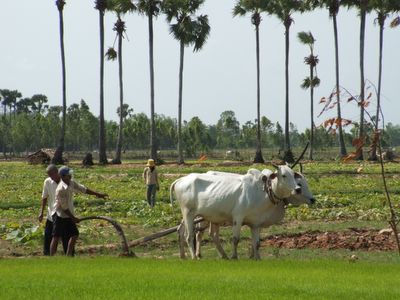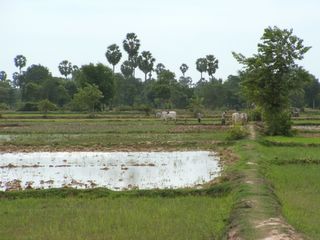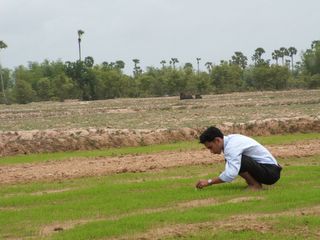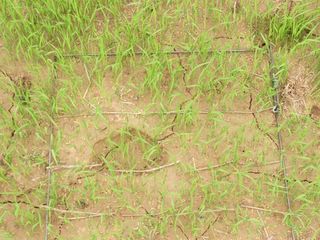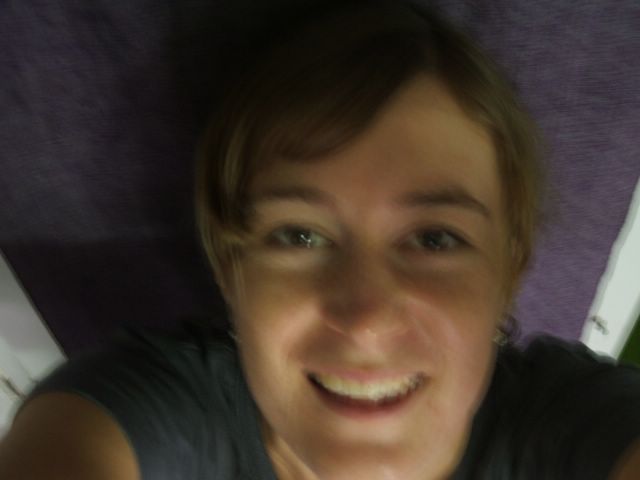Field Notes Part 2
It’s a Friday and I am out in Kandal again. The rice paddy we are in is very well irrigated meaning that I am ankle deep in mud and when I squat to count seedlings my bum gets wet. To make matters worse, this farmer has thrown in excess of 30 kgs of seed on half a hectare of land. Consequently, I am counting at least 900 to 1000 seedlings in each square. A farmer ambles along and stops to chat. He is barefoot, wearing three quarter length khaki pants, a ripped shirt, kramar around his neck and an army camouflage cap. He seems very taken by me and is constantly looking at me whilst chatting with Vichet about what we are doing. When he realises I speak some Khmer he comes over and asks me how old I am and whether I am married. I tell him and he smiles broadly, gold teeth flashing. “I am 36” he informs me, and then “you are very white”. I smile unsure of whether to say thank you or not, instead I say nothing and return to my seedlings. After a minute two more of staring the farmer goes on his way.
Back in the village I need to go to the bathroom. The village chief’s wife escorts me through the dirt laneways, past barking dogs to what is probably the only bathroom in the village. It is a squat toilet, with a bucket of water in the pitch dark. I am thankful, this is immeasurably better than the alternative: careful use of a sarong in the field. Afterwards I am kindly led as show-and-tell to a group of villagers who are sitting under one of the bigger houses. They sit me down on the slat bed and an elderly women scoots over to kneel right in front of me. Her hair is shaved, she flashes a toothless smile at me. I am not quite prepared for the attention and the onslaught of Khmer that comes next.
In a very friendly way, she proceeds to inspect every inch of me; her bony dark hands touching and prodding, all the while commentating for everybody’s benefit.
“So white”
“Very hairy arms”
“Is this silver? How much did it cost?”
I blush a lot and attempt to answer. There is a lot of discussion and laughter, most of which is entirely incomprehensible to me. I cover the key questions and explain that I am 26, and no, I am not married yet (in Khmer this statement is not correct unless you say “yet” at the end). She fingers my poly-cotton shirt and tells everyone it is silk.
“from France?”
I tell her that I am Australian and that my shirt is Australian too (although made in China would probably be closer to the truth).
“You look French”
“I’m Australian”
She remains unconvinced and defiantly says “French; their shirts the same”
Rather than argue I decide it is time to find Vichet and Chandra. I “chum riep” my way out of there.
Vichet is interviewing a farmer under her house on the other side of the village. The whole family is around, with the children playing in the yard. She tells us that they have had their rice seed for 2 years. They bought it from another farmer as it was known to be good seed. I am distracted by her youngest child who is toddling about wearing a yellow singlet and a smile. She is munching on a piece of corn and squatting in the dirt. As I look at her thinking how cute she is she takes a crap; with no underwear or nappy it mostly falls to the ground and mingles with the dirt. Later on, our interview concluded, her father scoops the baby up, hand on her bottom and places her on his lap. He dangles her proudly. I give thanks that I am in a country where women and men do not shake hands.
A chum riep greeting later we are on the road and on our way back to Phnom Penh. This white, hairy armed, city girl is rather tired. We enter the outskirts and are hit with the offensive of Friday peak hour traffic. Streams of young women piled on trailers towed by motos flow out of the city away from the garment factories, towards their families in the Provinces. I go home, wash the mud and dirt of Kandal off and then head towards my little make-shift family for an after work drink at the extremely un-Provincial Foreign Correspondents Club.
Back in the village I need to go to the bathroom. The village chief’s wife escorts me through the dirt laneways, past barking dogs to what is probably the only bathroom in the village. It is a squat toilet, with a bucket of water in the pitch dark. I am thankful, this is immeasurably better than the alternative: careful use of a sarong in the field. Afterwards I am kindly led as show-and-tell to a group of villagers who are sitting under one of the bigger houses. They sit me down on the slat bed and an elderly women scoots over to kneel right in front of me. Her hair is shaved, she flashes a toothless smile at me. I am not quite prepared for the attention and the onslaught of Khmer that comes next.
In a very friendly way, she proceeds to inspect every inch of me; her bony dark hands touching and prodding, all the while commentating for everybody’s benefit.
“So white”
“Very hairy arms”
“Is this silver? How much did it cost?”
I blush a lot and attempt to answer. There is a lot of discussion and laughter, most of which is entirely incomprehensible to me. I cover the key questions and explain that I am 26, and no, I am not married yet (in Khmer this statement is not correct unless you say “yet” at the end). She fingers my poly-cotton shirt and tells everyone it is silk.
“from France?”
I tell her that I am Australian and that my shirt is Australian too (although made in China would probably be closer to the truth).
“You look French”
“I’m Australian”
She remains unconvinced and defiantly says “French; their shirts the same”
Rather than argue I decide it is time to find Vichet and Chandra. I “chum riep” my way out of there.
Vichet is interviewing a farmer under her house on the other side of the village. The whole family is around, with the children playing in the yard. She tells us that they have had their rice seed for 2 years. They bought it from another farmer as it was known to be good seed. I am distracted by her youngest child who is toddling about wearing a yellow singlet and a smile. She is munching on a piece of corn and squatting in the dirt. As I look at her thinking how cute she is she takes a crap; with no underwear or nappy it mostly falls to the ground and mingles with the dirt. Later on, our interview concluded, her father scoops the baby up, hand on her bottom and places her on his lap. He dangles her proudly. I give thanks that I am in a country where women and men do not shake hands.
A chum riep greeting later we are on the road and on our way back to Phnom Penh. This white, hairy armed, city girl is rather tired. We enter the outskirts and are hit with the offensive of Friday peak hour traffic. Streams of young women piled on trailers towed by motos flow out of the city away from the garment factories, towards their families in the Provinces. I go home, wash the mud and dirt of Kandal off and then head towards my little make-shift family for an after work drink at the extremely un-Provincial Foreign Correspondents Club.
